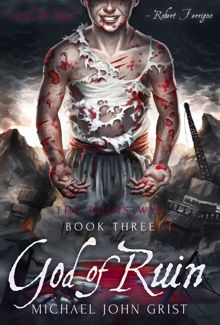 |
| Cover image (Goodreads) |
Sheltered in the Colony, beyond the city’s borders, Lydia is befriended by an advanced race of hunters and warriors, who do all they can to protect her and themselves from the Guardian. To survive in this new world, she must find courage and strength, and learn to face her fears. But to save her soulmate and the colonists from the Guardian, she must overcome those fears and embrace her inner strength.
I was drawn to The Colony by reading an extract online—not a very long extract, but it convinced me that here was an interesting main character, dropped into a challenging situation. I was hooked.
RM Gilmour's story begins in a familiar Earth, but quite rapidly shifts to a wider focus. "Our" Earth is only one among a small set of alternate parallel worlds. The inhabitants are recognisable, but each has pursued a slightly different line of development, both biological and technological. There is a complementarity about the various groups; like any other kind of diversity, this has the potential to go well for the separate groups, or to go really badly. There are a lot of echoes of today's world, as a diverse group of people plucked from their own context tries to establish a kind of refugee existence.
The central character, Lydia, would be interesting in any story, but her complex and painful back story fits particularly well in this setting. She is constantly having to reassess who can be trusted and why, and whether she can rely on her own perceptions of the situation. Her personal history does not predispose her to depend on others, nor to feel that she herself is anything other than a destructive influence. Ironically, this very capacity for destruction proves to be crucial for the plot, once properly directed.
The story takes many twists and turns—it is at times a love story, an abduction, a rebellion, or a desperate defence against unthinking aggressors. It is to the author's credit that she has handled these possibilities without the story becoming bogged down and confusing. Since we follow Lydia throughout, these changes seem natural developments as her own awareness grows.
The book provokes thought about important personal issues. The one I grappled with most was what draws two people together. The book proposes that it is our similarities which make for compatibility and love. I feel it is more to do with complementarity and difference, but I appreciated the fact that the book tackled the question head on.
In terms of editing, there were a few more slips than I had expected, chiefly around homonym words such as your / you're. A few of them had me puzzled for a moment, but none of them interfered with my great enjoyment of the book.
The Colony ends with the defeat of the enemy, once its identity has been finally clarified. However, the closing words suggest that the victory has brought new risks, almost before the dust settles, which I am sure will be explored in a second story.
In short, The Colony is an engaging and stimulating book, providing a new twist on the theme of parallel worlds. Well worth reading.
The author's website can be found here.
 In the battle to defeat King Ruin and protect the Bridge between souls, ex-Arctic marine Ritry Goligh tore his own soul into pieces. Now those pieces, embodied as six rugged marines spread across the tsunami-blasted world, are adrift without Ritry to guide them.
In the battle to defeat King Ruin and protect the Bridge between souls, ex-Arctic marine Ritry Goligh tore his own soul into pieces. Now those pieces, embodied as six rugged marines spread across the tsunami-blasted world, are adrift without Ritry to guide them.
 In the promos for the new season of Fear the Walking Dead, someone off-camera is heard to say, "To defeat the monster, you become the monster." In effect, that sums up what happens here. King Ruin's successor, the Pawn King, has built upon King Ruin's knowledge and gleaned how to transcend the Aetheric Bridge from Ritry's technique. With the knowledge gained from both, he becomes even stronger than King Ruin and Ritry's chord. Knowing what he's capable of, the chord wrestle with the moral dilemma: Does one adopt the tactics of the evil Pawn King in order to defeat him? Does the end justify the means? Many within the chord's army don't think so, and the debate threatens to tear them apart.
In the promos for the new season of Fear the Walking Dead, someone off-camera is heard to say, "To defeat the monster, you become the monster." In effect, that sums up what happens here. King Ruin's successor, the Pawn King, has built upon King Ruin's knowledge and gleaned how to transcend the Aetheric Bridge from Ritry's technique. With the knowledge gained from both, he becomes even stronger than King Ruin and Ritry's chord. Knowing what he's capable of, the chord wrestle with the moral dilemma: Does one adopt the tactics of the evil Pawn King in order to defeat him? Does the end justify the means? Many within the chord's army don't think so, and the debate threatens to tear them apart.
 Imagine a future where orphan children are adopted by international corporations and forced into indentured servitude, where zombie viruses are spread through heterosexual intercourse, where Osama bin Laden is cloned by the thousands for public execution. Welcome to the world of JUSTICE, INC. No one is safe. Nothing is sacred. And all sales are final.
Imagine a future where orphan children are adopted by international corporations and forced into indentured servitude, where zombie viruses are spread through heterosexual intercourse, where Osama bin Laden is cloned by the thousands for public execution. Welcome to the world of JUSTICE, INC. No one is safe. Nothing is sacred. And all sales are final.